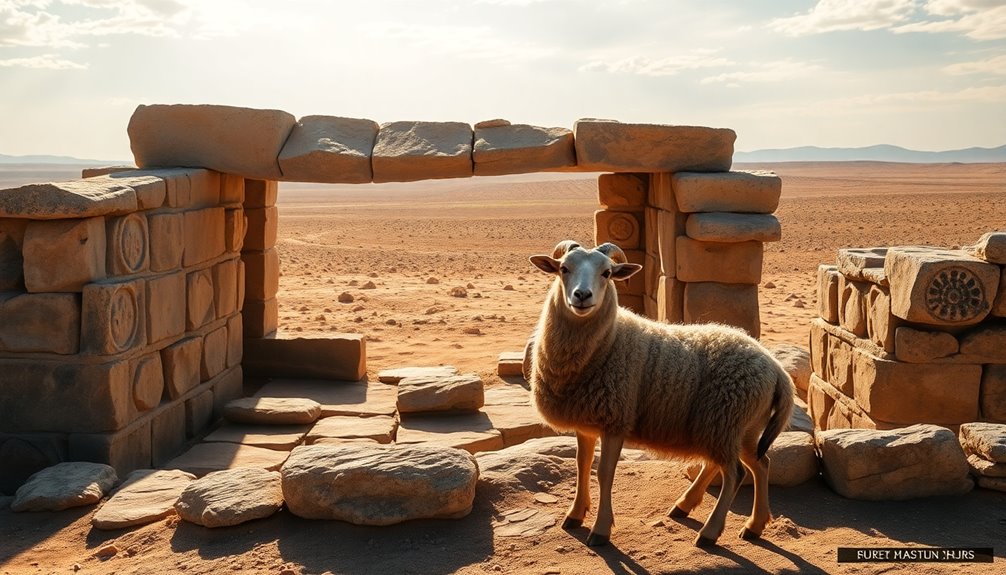Jehovah Jireh means "The LORD Will Provide," showcasing God's promise to meet your needs. This name comes from Abraham's experience in Genesis 22:14, where he trusted God during a profound test of faith. It reminds you that God's provision isn't just about immediate wants; it's about spiritual growth and the assurance that your deeper needs are seen and provided for. Misunderstandings often reduce God to a mere source of blessings, but true reliance on Jehovah Jireh opens doors to a stronger, more trusting relationship. If you explore further, you'll discover more about this incredible promise and its implications for your life.
Key Takeaways
- "Jehovah Jireh" means "The LORD Will Provide," reflecting God's assurance of meeting our needs as seen in Genesis 22:14.
- Abraham's faith in God's provision during Isaac's sacrifice illustrates obedience and trust in divine support during challenging times.
- Misunderstandings of divine provision often reduce God to a mere provider for immediate needs, overlooking spiritual growth through trials.
- Trusting in Jehovah Jireh during financial struggles encourages reliance on God's timing and fosters community support among believers.
- Spiritual sustenance and understanding God's wisdom are essential aspects of His provision, transcending mere physical needs.
Introduction

Jehovah Jireh, often translated as "The LORD Will Provide," holds deep significance in the faith journey of many believers. This name for God originates from a profound moment in Genesis 22:14, when Abraham, fully trusting in God's provision, names the place after receiving a ram as a substitute for his son Isaac. This act of obedience on Mt. Moriah not only highlights Abraham's faith but also serves as a powerful testament to God's unwavering provision.
The significance of Jehovah Jireh extends beyond that moment. As you reflect on God's ongoing commitment to provide, consider how this name encapsulates both past provisions and future assistance in your life. It reminds you that God is always present, ready to meet your needs, even when circumstances seem dire.
The event foreshadows the ultimate sacrifice of Jesus Christ, illustrating God's eternal wisdom and divine plan for salvation.
As you engage with this name in worship, whether through hymns or contemporary songs, you'll discover its profound impact on faith communities and your personal spiritual journey. Jehovah Jireh invites you to embrace a deeper understanding of God's faithful provision in every aspect of your life.
Primary Biblical Context

When you explore the primary biblical context of "Jehovah Jireh," you'll find its roots in Genesis 22:14, where Abraham's faith in God's provision unfolds dramatically.
This pivotal moment not only highlights God's intervention but also sets the stage for understanding His ongoing care for His people.
As you reflect on these scripture references, consider how they shape the broader narrative of divine provision throughout the Bible.
Primary Bible References
In the story of Abraham and Isaac, we see a powerful example of God's provision that resonates through the ages. In Genesis 22, God commands Abraham to sacrifice his beloved son, Isaac, as a burnt offering. This command tests Abraham's faith and obedience, showcasing the depth of his trust in God.
As they journey to Mt. Moriah, you can feel the tension building, as Abraham prepares to follow through with God's command. When Abraham raises his knife, an angel intervenes, stopping him from sacrificing Isaac. Instead, God provides a ram caught in a thicket, demonstrating the true meaning of Jehovah Jireh, or "The LORD Will Provide."
In Genesis 22:14, Abraham names the location, signifying that God's provision isn't just a one-time event but a promise for all His people. The phrase, "On the mountain of the Lord it will be provided," encapsulates the assurance of divine care.
This story not only illustrates God's provision in Abraham's life but also foreshadows Jesus as the ultimate sacrifice, linking the Old Testament with New Testament themes of redemption and grace.
Secondary Bible References
Many biblical passages echo the theme of God as a provider, reinforcing the significance of the name Jehovah Jireh. In Genesis 22:14, Abraham names the place where God provided a ram as a substitute sacrifice for Isaac. This powerful moment highlights that God will provide not just in moments of crisis but also as a continual source of provision in our lives.
As you explore the broader biblical narrative, you'll see how the concept of Jehovah Jireh extends beyond Abraham's story. It connects to the construction of Solomon's temple on Mt. Moriah, symbolizing God's ongoing provision for His people.
In the New Testament, the theme culminates with Jesus' sacrificial death, linking Abraham's faith to the ultimate provision of salvation.
This rich tapestry of references illustrates that God's provision isn't limited to material needs; it encompasses spiritual fulfillment as well. When you reflect on these scriptures, you recognize that God's promise of provision echoes through history, reminding you that, like Abraham, you can trust that He'll always provide the necessary lamb for your needs.
Ancient Near Eastern Sacrifices

Ancient Near Eastern sacrifices played a crucial role in the spiritual and social fabric of various cultures, intertwining agricultural practices with religious observance.
You'd find that these sacrifices often involved offering animals, grains, or fruits to appease deities and seek their favor. The purpose varied—sometimes it was about atoning for sins, expressing gratitude, or asking for divine intervention in critical situations like fertility or harvests.
Priests typically performed these sacrificial rites, acting as mediators between the worshippers and their gods. They ensured the correct rituals were followed to avoid offending the deities.
Different cultures, such as the Canaanites, Babylonians, and Egyptians, had distinct rituals and types of sacrifices shaped by their theological beliefs and social structures.
The concept of substitutionary sacrifice emerges prominently in the story of Abraham, where a ram was provided as a substitute for Isaac. This reflects a broader theme of divine provision within God's Plan, illustrating mercy and the significance of sacrifices in both personal and communal contexts.
Understanding these ancient practices can deepen your appreciation for the intricate relationship between sacrifice, faith, and cultural identity in the Ancient Near East.
Divine Provision in Sacrifice

Moreover, this story foreshadows the ultimate sacrifice of Jesus Christ, the Lamb of God, reinforcing the theme of substitutionary sacrifice throughout biblical theology.
Jehovah Jireh stands as a testament to God's ongoing commitment to provide, reminding you that even in moments of sacrifice, God provides for your spiritual and physical needs.
Misunderstanding Divine Provision

When you think about divine provision, it's easy to fall into common misconceptions that reduce God to a simple provider for your immediate needs.
Many people interpret His blessings through cultural lenses, expecting Him to fulfill personal desires without considering the broader spiritual context.
It's essential to recognize that true provision from Jehovah Jireh involves not just material gifts, but also growth and strength during life's challenges.
Debunking Common Misconceptions
Often, people misunderstand the concept of Jehovah Jireh, mistakenly thinking it means God will fulfill every desire on demand, much like a vending machine. In reality, the name Jehovah Jireh, meaning "The LORD Will Provide," emphasizes a deeper relationship grounded in trust and faith.
It's essential to recognize that God's provision isn't about instant gratification but about His perfect timing and wisdom.
The biblical narrative of Abraham and Isaac illustrates this beautifully. Abraham's faith was tested when he was asked to sacrifice his son. In that moment, he relied on God's provision, which ultimately revealed a greater purpose.
Sometimes, God's provision involves challenges that foster spiritual growth, helping you endure tests of faith.
Misinterpretations often arise when people focus solely on material needs, neglecting the spiritual insights that come from trials. Understanding "Jireh" as "to see" adds depth, suggesting that God's provision aligns with His foresight of your true needs rather than merely responding to your immediate wants.
Embracing this perspective helps you appreciate the richness of God's provision, both in the physical and spiritual realms.
Cultural Interpretations of Provision
Cultural interpretations of provision can significantly distort our understanding of what it means for God to provide. Many view Jehovah Jireh as a transactional relationship, treating Him like a vending machine that dispenses blessings on demand. This perspective overlooks the deeper spiritual growth involved in reliance on God's timing and wisdom.
When you hear "Jehovah Jireh," it's easy to think only of material needs. However, this interpretation misses the profound implications for your faith, especially during trials. Anecdotes about trivial provisions can dilute the sacred meaning of divine support, ignoring the critical moments when God truly meets our needs, like during financial crises or health challenges.
Misunderstanding the Hebrew root of "Jireh," which means "to see," can further limit your view of provision. It's essential to recognize that God sees and fulfills both your physical and spiritual needs holistically.
This cultural misinterpretation can lead to disappointment, as you might expect immediate gratification. Instead, embrace the truth that God's timing often involves growth through faith and perseverance, allowing you to experience a deeper connection with Him and a more authentic understanding of divine provision.
Daily Reliance on God's Provision

When you face financial struggles, trusting in God's provision can transform your outlook and strengthen your faith.
It's important to not only rely on divine help but also to engage in community resource sharing, as this reflects God's love in action.
Together, these practices remind you that you're never alone in your journey.
Trusting God in Financial Struggles
Trusting in God's provision during financial struggles requires a steadfast belief in His promise to meet your needs. When you embrace the name Jehovah Jireh, you acknowledge that God will provide, just as He provided a ram for Abraham. This belief encourages you to seek divine guidance instead of relying solely on your efforts when facing economic difficulties.
Financial struggles can test your faith, revealing opportunities for deeper reliance on God's provision. Philippians 4:19 reassures you that "God will supply every need of yours according to his riches in glory in Christ Jesus."
Remember, these challenges are often temporary and part of a larger plan. Emphasizing prayer and gratitude helps cultivate a mindset of trust in God's timing.
As you reflect on personal testimonies of faith during hardships, you may find inspiration in how God's provision often manifests in unexpected ways. Each time you see His hand at work, it reinforces the assurance that the Lord will provide in times of need.
Community Resource Sharing
Community resource sharing embodies the spirit of Jehovah Jireh by emphasizing the importance of mutual support and collaboration among individuals. When you engage in community sharing, you rely on each other for essential resources, fostering a collective trust in God's provision.
Many faith-based organizations thrive on this principle, encouraging members to contribute food, clothing, and financial aid to those in need. Programs like food banks and community kitchens are practical examples of Jehovah Jireh in action. They ensure that individuals facing hardship can access vital resources, showcasing how God's provision often comes through the generosity of others.
This act of communal support not only addresses immediate physical needs but also strengthens relationships within the community, reinforcing the belief that God provides for His people through shared interactions.
Regular gatherings focused on sharing resources and testimonies of provision serve as reminders of God's faithfulness. They encourage you and others to continue trusting in His ability to meet your needs as you help one another.
Final Thoughts on Provision

Provision is a fundamental aspect of faith that goes beyond mere survival; it's about recognizing God's continual support in our lives. The name Jehovah Jireh, meaning "The LORD Will Provide," serves as a powerful reminder of this truth. It draws us back to Abraham's remarkable journey when he faced the ultimate sacrifice of Isaac on Mt. Moriah. In that moment of profound faith and obedience, Abraham proclaimed Jehovah Jireh after experiencing God's divine intervention.
This declaration isn't just a historical reference; it highlights the assurance that God will meet our needs even in our darkest hours. Understanding Jehovah Jireh prompts you to trust in God's timing and sovereignty, recognizing that true provision aligns with His divine wisdom rather than your immediate desires.
Moreover, the implications of Jehovah Jireh extend beyond material needs, encompassing spiritual sustenance and the ultimate provision through Jesus Christ's sacrificial love.
As you navigate life's challenges, remember that your faith in the LORD opens the door to experiencing His provisions, both seen and unseen. Stay anchored in this promise, knowing that God's support is unwavering, guiding you through every trial you face.
Additional Resources

Exploring the concept of Jehovah Jireh can be greatly enriched by a variety of resources that deepen your understanding of God's provision.
One valuable resource is "The Names of God" by Ken Hemphill, which thoroughly examines the significance of Jehovah Jireh, particularly in the context of Abraham and Isaac. For an in-depth Bible study, consider using Logos Bible Software, where you can access extensive materials that delve into the Old Testament passages related to God's provision.
Additionally, contemporary worship songs like Don Moen's 1986 track and Maverick City Music's "Jireh" (2021) continue to reflect the enduring relevance of Jehovah Jireh in modern faith.
You can further appreciate the theme of divine provision through John Newton's hymn, which connects historical and modern expressions of faith.
Lastly, consider supporting organizations like Jehovah Jireh Children's Homes in Kenya. They embody the principle of God's provision by reaching out to vulnerable populations in need.
Frequently Asked Questions
What Does Jehovah Jireh Mean?
When you hear the term, it signifies the idea of divine provision.
It emphasizes that someone is always there to offer support, especially in times of need.
This concept assures you that help will come, reflecting a relationship built on faith and trust.
It's about recognizing the moments when unexpected resources or assistance appear in your life, reminding you that you're not alone and that there's a greater purpose guiding your journey.
What Does Jehovah Jireh Mean Dictionary?
In a dictionary context, "Jehovah Jireh" means "The LORD Will Provide."
It highlights the belief that God is a dependable provider, offering support and resources when needed. This term captures the essence of divine assistance, emphasizing trust in God's ability to meet your needs.
It speaks to both historical and ongoing provision, reminding you to rely on faith in times of uncertainty and to acknowledge the blessings you receive daily.
What Is the Name of God as Our Provider?
When you think about God as your provider, you might recognize Him by names that reflect His role in your life. One common name is "The LORD Will Provide," which emphasizes His promise to meet your needs.
You can trust that He's always there, ready to supply what you lack, whether it's physical needs, emotional support, or spiritual guidance.
Embracing this truth can bring peace and assurance during challenging times.
What Is Jehovah Jireh and Jehovah Rapha?
Jehovah Rapha means "The LORD Who Heals," highlighting God's ability to provide healing in times of physical and spiritual distress.
On the other hand, Jehovah Jireh means "The LORD Will Provide," emphasizing God's provision during life's challenges.
Both names showcase how God cares for you, meeting your needs for healing and sustenance.
They remind you that, no matter the circumstance, you can trust in His unwavering support and love.










